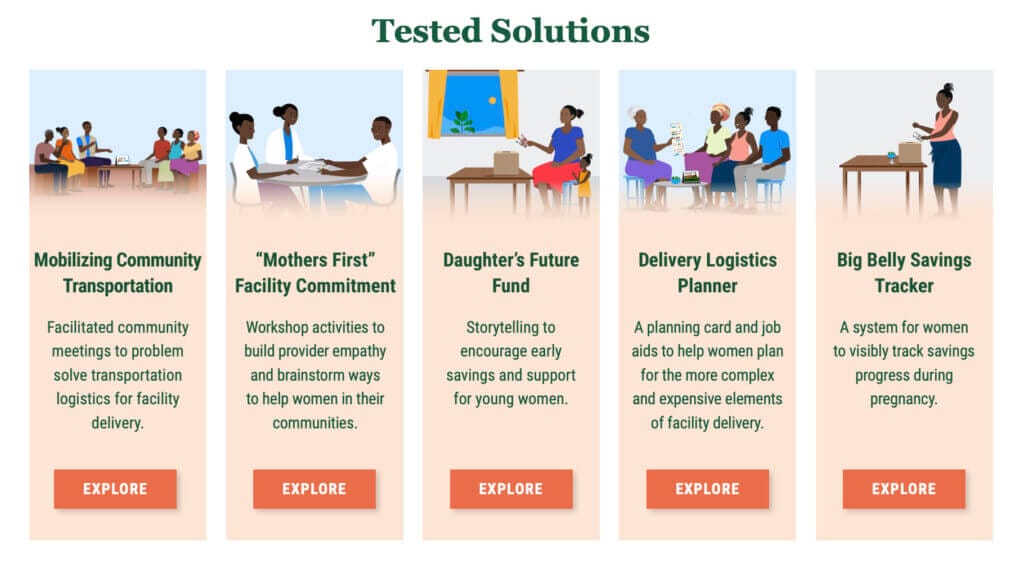For many rural low-income pregnant women in Liberia, the ability to deliver at a health facility is riddled with barriers. While they may intend to deliver their baby at a health facility and believe it’s the safest place to give birth, it often requires extensive planning and saving, from determining when and how to leave for the facility, to saving for the cost of transportation and medical supplies required at the facility.
In 2021, our Global Health team in partnership with Breakthrough ACTION undertook a new project to address these challenges. We conducted formative research applying a behavioral science lens to explore the context-shaping decision-making and behavior of pregnant women—and others with influence—then undertook a collaborative co-design process that engaged local and national government stakeholders, pregnant and postpartum women and their families, and community and facility-based health workers. The resulting set of behaviorally informed solutions helps to address barriers and facilitate facility-based delivery (FBD); for example, by leveraging Liberian storytelling traditions to build on the important relationship between women and trained traditional midwives (TTMs). We are excited to share the next phase of this work!
We are currently piloting the solution set in two districts, Buchanan District and District 4, in collaboration with Americares, a health-focused relief and development organization that has been working in Liberia since 2015.
After an initial training on how to implement the solutions, program implementers, policymakers, and health workers were enthusiastic about the designs and their ability to support women in their communities seeking to access safer deliveries. Some of the feedback we received included:
Before, pregnant women will come to the facility, we will just check you and tell you to do this, buy this, buy this, but now, through the tools we understand that early planning helps a lot to prevent you from difficulties while carry your baby. – Provider, Grand Bassa
It’s [savings tracker] a good thing because we never had the idea first, but now we have the idea, we used to just tell them when to come to the clinic, we didn’t use to tell them how to keep money in cash box. So the thing I learned from there it’s good because when the cash box is there you’ll be able to save small money. So when time come you can look in the cashbox to solve some problem. – TTM, Grand Bassa
Yes we never use to plan with them [pregnant women], but now right after the training we decided to plan how to save money for them for their saving…The training I really like it because it’s encouraging mainly the stories made for people to come to themselves and say yes let me go to the hospital, it’s helping we, the CHA, ourselves because we used to talk to them, they would say “all my children I been borning how I used to born them” but the stories when you talk to them they can listen. – Community Health Assistant, Grand Bassa
In the training where I was one participant–it was very interactive, the materials used were accessible and then, yes we had a good time because we were able to talk lengthily and the time for the training was appropriate… During the training that we saw, they [TTMs] were zealous, they have the interest. It is something that they have been doing, but not in this manner… From what I saw, I know that they are willing to use it [planning tools]. – Grand Bassa County Health Team
Leveraging this enthusiasm, we plan to apply forthcoming insights gained from the initial pilot period to continue to refine and update our facility-based delivery solutions and implementation guidance. Ultimately, implementation of the solutions will extend beyond the initial districts and will support more rural Liberian women to succeed in following through on their intention to deliver at the health facility—and help make more births safe for women and their infants.
If you are interested in implementing the facility-based delivery (FBD) designs or would like more information, please visit our design guide and reach out to us at gh@ideas42.org.




